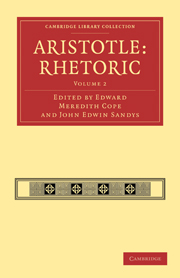APPENDIX D - On ἂv with the optative after certain particles
Published online by Cambridge University Press: 07 September 2010
Summary
The attempt to control the free expansion of the Greek language by rigorous rules which forbade the deviation from set forms of speech, and allowed for no irregularities of expression by which nice shades and varieties of thought and feeling might be conveyed; rules derived mostly from a somewhat limited observation, often from the usages of the tragic and comic writers alone, the least departure from which was to be summarily and peremptorily emended; this attempt, which was involved in the practice of scholars like Dawes, Porson, Elmsley and Monk and their followers, has been happily frustrated, and we have learned, chiefly under the guidance of Godfrey Hermann, to deal more liberally and logically with Greek grammar. That Hermann was infallible; that he did not sometimes overreach himself by his own ingenuity; that his nice and subtle distinctions in the interpretation of grammatical variations are always well founded; or that he is always consistent in his explanations, I will not take upon me to assert: but it may at least be said that in this branch of scholarship, the application of logic to Greek grammar, he has done more than any other scholar, past or present.
Information
- Type
- Chapter
- Information
- Aristotle: Rhetoric , pp. 336 - 340Publisher: Cambridge University PressPrint publication year: 2010First published in: 1877
